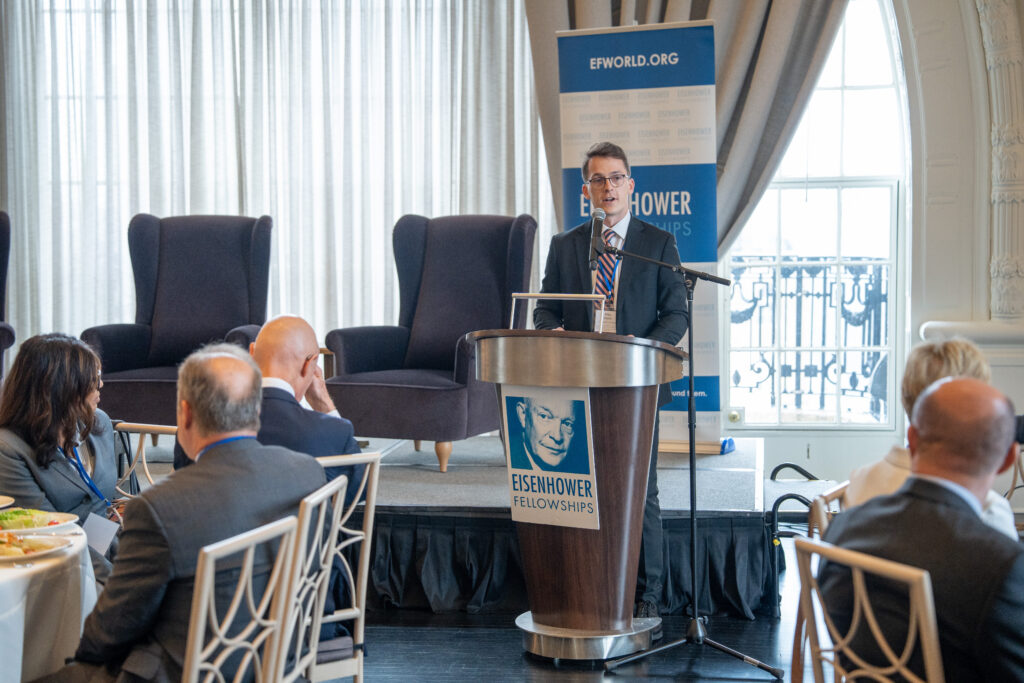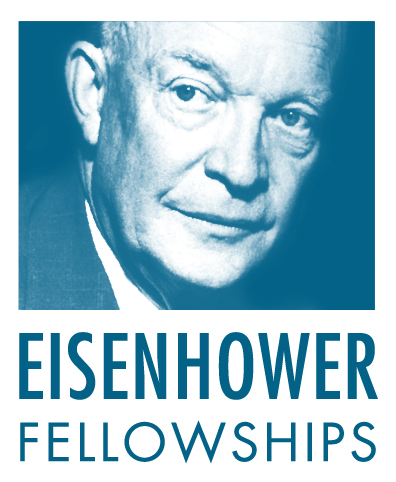Riley Owen, 2024 Eisenhower Global Scholar
Master in Public Policy, Blavatnik School of Government at the University of Oxford
Remarks at the 2025 Trustees Lunch
May 14, 2025
Bellevue Hotel, Philadelphia
It is a true honor to be here. I’d like everyone to know how phenomenal my peers Rishma, Kay, and Grace all are and that any of them could be up here providing more entertainment and insight than I can.
I was that weird kid who knew what he wanted to do since he was about 10 years old. I’d sit around Boy Scout campfires and unironically tell people I wanted to be the Secretary of State one day. While other kids were doing normal kid things, I found myself volunteering on campaigns, knocking doors, and running for offices in local,statewide, and national youth organizations. I could tell you what the Wilsonian international order was but didn’t have a clue how to talk to a girl.
At one point in my early teen years, I took out a yellow legal pad and wrote out my goals for the next decade of my life: 1) Study international relations at Princeton, 2) Volunteer as an ambassador of my faith for two years, 3) Become a naval officer, 4) Serve in the White House, and 5) Study at Oxford. The Eisenhower Scholarship made Oxford possible for me. A decade later, I now find myself needing to make my next set of goals.

I want to share just two of the many insights I gleaned as an Eisenhower Scholar that guide this next decade in my life of service:
FIRST: We don’t need to make people fear the world in order to secure the world.
In the early months of Oxford, I commissioned into the Navy Reserve as an intelligence officer. As my dad gleefully quips, “I’m glad after 26 years, you finally found some!” I completed an intel school last summer in Stuttgart next to the building where General Eisenhower served as NATO’s first Supreme Allied Commander of Europe. Walking past it each day for two weeks, I reflected on the fear that had been conquered again and again in those years with unity, courage, and persistence. From that training, I headed straight into one of my many trips to Ukraine last year.
At Princeton and in government, I was very focused on Arctic security and Greenland specifically. However, in England, I grew weary watching peers simply talk about, post about, dress about, and gather about destabilizing events around the world. I wanted to do something about them.
Halfway through Oxford, I joined a team striving to disrupt the bloated and sclerotic defense industrial base that President Eisenhower warned us of. I’m proud to say we have made great strides to make deterrence cheaper for democracies enabling more effective investment of energy and resources into sectors such as infrastructure, education, energy, housing, innovation, and industry that all enable human flourishing.
As an Eisenhower Scholar, my peers didn’t just present statistics and histories, they had shaped them: an Afghan refugee, Sudanese and Somali officials, Israeli veteran mothers and Palestinian poets, Russian and Ukrainian civil servants, a Chinese journalist and West Point graduates. Please don’t misunderstand me, many geopolitical tensions are the result of diametrically opposed goals and values where peace through strength is critical, though I am convinced that innovation, unity, and trust will do far more to secure our world than fear-mongering.
SECOND: Most people (and peoples) just want to feel seen, heard, and respected.
If you can achieve this, most barriers can be overcome and progress can be made. It sounds easy, but it’s a profoundly difficult thing that I’m still learning to do. It requires ruthless self-awareness, patient persistence, and thick skin. I wanted to study at Oxford because if I am truly to continue a career in foreign policy and diplomacy, I felt a responsibility to better understand how America is viewed by peoples of the world. Frankly, I was exhausted with a year of countless, frustratingly difficult conversations that broadened my perspectives and strengthened my thinking.
To be understood is a luxury. Often, people won’t take the time – that’s out of my control. But to understand is a responsibility and completely within my control. Conversations that began with contention more often than not abated to camaraderie as I learned to see instead of being seen. I extrapolate these interpersonal lessons to how I believe nations can better interact today. Nobody has a monopoly on truth and extremes of any variety are almost always wrong.
I am, for the rest of my life, deeply indebted to Eisenhower Fellowships. I’m confident my peers with me here today feel the same. Secretary Gates, George, Erin, Stephanie, and the scores of others in and beyond this room who supported us financially and logistically, thank you. You have made me a better citizen, scholar, officer, servant, and friend.
